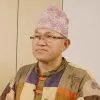contributions for transformative assessment day 1 (transformative change as a system change)
Since historical period of time, as the first nation indigenous peoples are observing the pattern of changes that occured in ecosystems, biodiversity their terriotories, lands, water, mountains, glacier, lakes, landscape and copping with the sconaros, adapt with more fevourable in holistic or dynamic manner living with harmony Mother Earth. Based on indigenous or local or traditional or traditional ecological knowledge, practices and innovation in accordance witth geo bio physical situation Indigenous peoples have more expertises, more experiences, values, spiritual and better understanding on Climate, ecosystem, resources, diversity, management, utilization, governance, conservation and customary sustainable use. The indigenous traditions and customary system of indingenous peoples contribute more than 80% world biodiversity remains in theri territories, It is reported that more wild relatives species and their diversity are available in indigenous inhavitant the sixth National Biodiversity Report of Nepal 2018.
Indigenous languages, local knowledge, wisdom, traditions, religious, folklore, tangible and intangible social, cultural, spiritual values of indigenous peoples associated nature, ecosystems, environment, biodiversity, wild or native species, genetic resources, pollinators, water and universe and are contributing for conservation. Indigenous peoples and local communities are willing to share, contribute with other stakholders, researchers, governmental line agencies, conservationists, scientists, planners, policy makers for better understanding to conserve, mitigate, adapt and to save Alive Mother Earth ensuring Free, Prior and Inform Consent, Full and effective participation.
Capacity building, Institutional enhancement, engagement, recognitions and respect can be the way forward for indigenous and local communities. Researchers, conservationist, scientists, policy makers, government, private and other civil societies must be trust buid with the rights holders to address the issues of the transfermative Changes.
Kamal Kumar Rai
IPs Volunteer on TK and Biodiversity
Himalayan Folklore and Biodiversity Study Program
Indigenous Knowledge and Peoples Network
Society for Wetland Biodiversity Conservation Nepal
Federation of Kirant Indigenous Associations Nepal Samarung
Po Box 12476
Kathmandu
Nepal
